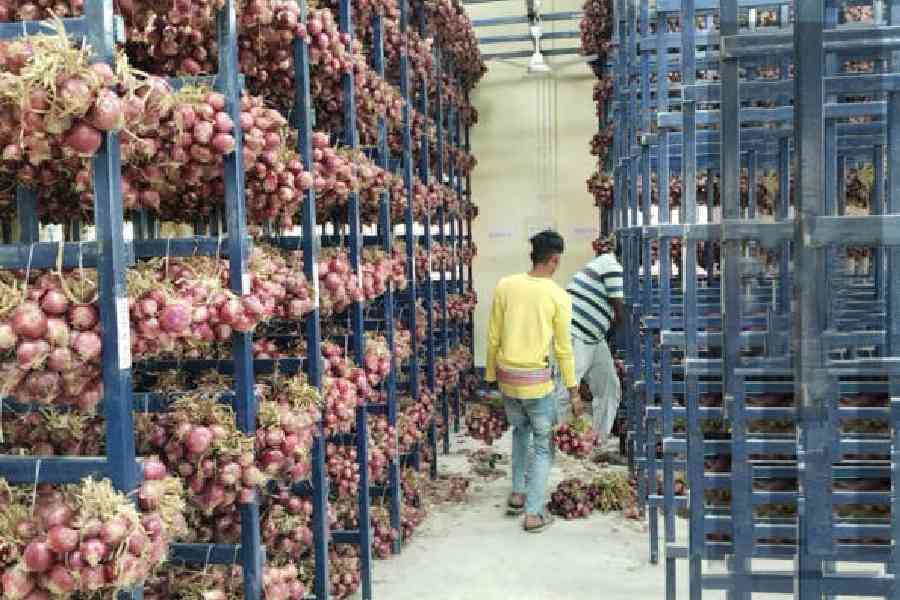The Bengal government has set up eight new onion storage units with larger capacity as part of its drive to increase reserves of this kitchen staple to meet demand during crises, as managing the skyrocketing retail price of the produce often left the administration in distress.
“We had already set up 1,400 small onion storage units with a reserve capacity of around 25 tons each. For the first time, we’ve established eight new storage units with a larger capacity of 40 tons each as a pilot project. If the initiative proves successful, we will set up more such units shortly,” said a senior agricultural marketing department official.
In 2023-24, Bengal produced around 8.85 lakh tons of onions, while the state’s annual consumption of the crop is roughly 10-12 lakh tons. The gap between the state’s production and demand compels Bengal to rely heavily on supplies from Nashik in Maharashtra, as well as Karnataka, Andhra Pradesh, Rajasthan and Bihar.
A source said increasing the number of onion storage facilities had become a necessity for the government, as the sudden surge in the price often created political discomfort for the ruling dispensation almost every year. The new facilities have come up in Hooghly’s Balagarh and Polba, East Burdwan’s Kalna 2 and Purbasthali, Murshidabad’s Nowda and Sagardighi, Nadia’s Hanskhali and Malda’s Gajol.
Chief minister Mamata Banerjee often expressed dissatisfaction over the failure to curb the onion’s retail price, particularly during the festive seasons. Despite the government trying to manage the situation by offering onions from state-run Sufal Bangla outlets at a price lower than the open retail rate, the effort remains inadequate to meet the demand.
A senior government official has explained that onion harvesting in Bengal occurs during March and April, forcing farmers to sell the perishable produce quickly because of limited storage facilities. As a result, the retail market sees an abundant supply till June, but a shortage typically follows from July to October.
“Because of the lack of storage facilities, Bengal’s onion farmers are often forced to sell their produce to other states to avoid losses caused by spoilage. Storing onions in these newly built units will help preserve them for around eight months and reduce supply shortages during the typical crisis period,” said the official.
“The main challenge in storing onions for months is high humidity. The new units are different from traditional cold storage facilities used for potatoes. Instead, these warehouses are designed with improved air circulation and exhaust systems to reduce humidity,” he added.
The Bengal government has already sanctioned 1,300 additional small onion storage units at farmers’ homes. The horticulture department is assisting farmers in setting up these facilities at their homes.
“Unlike Maharashtra or Rajasthan, building large-scale onion storage units is not feasible in Bengal because of its humid climate. Therefore, we are focusing on setting up small and medium-sized storage units to preserve more onions,” said a source in the agriculture marketing department.
In addition to expanding storage facilities, the government has decided to procure onions in bulk directly from farmers to maintain a parallel stock at government-run Sufal Bangla outlets. This is the first time the agriculture marketing department has begun procuring onions, offering ₹2,200 per quintal compared to the open market price that varies between ₹1,600 and ₹1,800 per quintal.
“This initiative will encourage farmers to sell directly to the government, preventing distress sales,” a source said.
Rabi Shankar Mukherjee, an onion farmer from Hooghly’s Balagarh, welcomed the government’s move to support farmers in building storage units for their produce.
“Earlier, the government experimented with a cooling system-equipped storage house in Balagarh, but it was unsuccessful. Now, the government has chosen the right method for preserving onions, which we have been following for years,” Mukherjee said.
The government believes that if sufficient storage units are established, onion production will increase, making the state self-reliant in onion supply.










